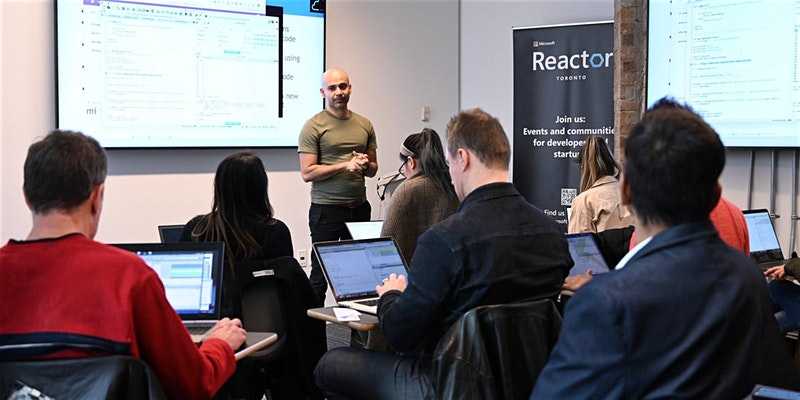Cronicle Content Series: Content Marketing Plan #4 -- Public Event Speaking
By Laura Cowan
Laura K. Cowan is a tech, business, and wellness journalist and fantasy author whose work has focused on promoting sustainability initiatives and helping individuals find a sense of connection with the natural world.
Emerging tech hub Ann Arbor is now home to hundreds of tech companies from biotech to mobility and software/security. If you're thinking about public speaking for your tech startup, a great place to start is in the smaller tech hubs where speaking gigs are accessible to small startup founders.
This is a continuation of our Cronicle Consulting content marketing series for tech startups. If you would like to catch up, check out Part 1: Company Blog, Part 2: Guest Posting & Interviews, and Part 3: Podcast....
Content Marketing Through Public Speaking
Public speaking is one way to create more content as part of a content marketing strategy for your tech startup. Because many large conferences recently shifted online, public speaking has never been more accessible. If you would like to try conference or event speaking, you can get on the circuit several ways.
How To Get On the Conference Public Speaking Circuit
Events such as this Detroit Bamboo Coworking get-together showcase the variety of events at which you can speak. If you're just getting your feet wet, start in a more intimate space and work up to larger events as you hone speeches that work for larger crowds.
- Speaking bureaus. If you have an established presence or platform in your industry, the easiest way to get on the public speaking circuit is by applying to public speaking bureaus. You can work through an agent if you have a large audience to market to, or sign up yourself.
- Professional events. For those professionals without a large platform, there is the more informal way of speaking at a professional event. Conferences send out a call for papers on themed events, such as mobility tech innovations, best practices in management, and the like. Try looking up your favorite conferences to see if they have a call for speakers, and send them a pitch. Remember this doesn't have to be exclusively in your industry. Think a bit laterally as well to related events, or other industries that might want to hear about what's going on in your space.
- Niche tech events. Many tech industry events happen in small niche pockets of technical interest, such as small annual conferences focused on specific technologies or industries. Start with your area of expertise and favorite events, and work out from there to see what's available. Also, ask around your social network. Many people would love to have you speak at their coworking event space or networking event. Often the easiest way to do this is to offer to speak at someone's venue during a regular monthly event they will want to book speakers for.
One of the best ways to think about public speaking as content marketing is to remember that you're helping other people create content for their audiences, not just getting your message out. If you can keep your focus on how to benefit other venues' content marketing, you will find a great match sooner or later.
How To Create a Speech for a Tech Event
Now you have a great speaking gig lined up. How do you put together a speech? You might want to start out with an outline even if you're comfortable speaking off the cuff, but as public speaking is often more feared than death, it doesn't hurt to have a few extra pointers to get started.
Events like TU-Automotive Detroit are a nice in between from smaller tech industry meetups and large conferences. Many speeches come from owners of smaller mobility startups getting a foothold in the industry, but the venue is still quite large.
The simplest public speechwriting approach is to focus on solutions to a problem you or your team has recently grappled with. Here's how.
- Cheerleader stories. Tell stories about how you supported a vision and made it happen. Place your client in the role of hero with you supporting, don't place yourself in the hero seat or it won't relate as well to others. Remember that your audience wants to hear something about your experience that might help them along their path, so you don't have to pretend you were perfect. It's more relatable if you weren't.
- Lessons learned. Tell a story about a hard lesson you learned. No need to be too hard on yourself, these kinds of speeches are just comforting for people who are in the midst of the same struggle. What did you learn by doing something wrong? The tone could be funny, or instructive, or encouraging, depending on whatever personality suits you or the event.
- Speeches as searchable content. You'll want to make this speech searchable as content later, whether the event is recorded in video form or summarized in print. This helps you share the speech on social media, promote your partner organizations for good will, and creates good SEO for people searching for your content later so they come to see you as a thought leader on the subject. A how-to listicle approach to a speech can be helpful to make your content searchable. "5 Ways To Help Your Startup Grow In The First 6 Months," or "How Do I Decide Whether To Incorporate My Business?" "Types of Diversity Training Programs For Your Company To Consider," that sort of thing. Think about what you would search for if you were looking for this kind of advice, and be sure to include those keywords in the speech title so people can find it.
Public speaking can also take the form of instruction, such as this DevOps Bootcamp in Detroit. Whatever keeps your name in the ring as a generous industry partner.
Host Your Own Professional Event
Running out of options for speaking events? Host your own event and create the keynote speech. Creating a CFP, or call for papers, is one of the first steps to posting availability of public speaking gigs online. You can host an informal event where your company discusses their latest technology or invites industry leaders to talk about emerging trends. The easiest way to do this is a video broadcast live and recorded for posting later.
If you want to host a more formal event, there are a few steps you should know:
- You will need to look into the necessary legal structure for an organization hosting an event, such as a nonprofit structure for accepting sponsorships to host a franchised tech conference event in your area. Each type of event may have its own requirements for legal structure and mission statement to fulfill the stated mission of hosting a regular annual event under the organizational umbrella.
- Create an event page. Gauge interest on social media.
- Post a call for papers. Often this is what really draws in speakers so you know what you have to work with when planning an event. You can ask for a general call for papers on a conference's typical theme such as devops, and then build your event around whatever response you get to keep the content balanced.
- Get started recruiting sponsorships for the event, whether that's advertising, catering sponsorships, or scholarships for tickets.
- Contact your speakers to let them know if they have a spot on the roster, graciously apologize to everyone you couldn't fit on the docket this year and keep their contact info for another year to fill gaps in the roster.
- Plan your event around the theme listed in your cfp. Let the speakers know the deadlines for getting in speech outlines or any requested pre-recorded materials for virtual attendance.
Planning an event like this can be a lot of work, so we recommend it for companies that have a team to work on events and some planning resources so it doesn't suck up all your time and finances. Also, it helps if you keep the goal of the event targeted, such as building community in a particular area where your company wants to be involved. If the event is online, you'll need some kind of hosting program, ability to record the sessions, video capabilities you could outsource to a local video production company, and possibly the option to pre-record and replay speeches or segues in the event.
Ann Arbor's a2tech360 tech week's TechTalk is a popular event that normally packs out the Michigan Theater. In 2020, the event shifted online and used a hosting program to allow for chat, questions, a networking room attended by mentors and speakers, and a seamless online MC prerecorded to help segue the event between speakers.
You'll also want a host or hostess who MCs the proceedings whether live or virtually, to keep the event running smoothly. If your event is online, you need a moderator to process questions and chat comments, and some way to collect contact information from people signing up for the event so you can follow up and thank them or offer them more communication or products and services they might want to opt in for. Please keep that to passive offerings and don't be pushy unless you have some amazing flywheel marketing plan up your sleeve you want to announce.
If you are planning an in-person event, you will need to be aware of rental cancellation policies, plus all safety regulations. These days you'll need to keep on top of public health notices for safe planning. It doesn't hurt to have a live broadcast and an online backup plan in case the event needs to shift online or change venues. Finally, you'll want someone to keep track of the finances for all this. A treasurer on your team is a must, as well as good bookkeeping.
Don't forget to think outside your industry for events: Intermitten, a tech event in Ann Arbor focused on change, diversity, and inclusion, is a great example of thinking laterally for speaking engagements.
If you're handling public speaking through a bureau or speaking informally at events, it doesn't have to be complicated. Public speaking is a great way to get your company's insights and successes in front of potential clients and to give back your best to your industry. It can take some time. Start with a pitch list of your favorite groups and events and favorite topics you think people would like to learn more about, and you'll find something that clicks.
Hate public speaking as much as a body full of bee stings? That's perfectly fine. There are plenty of other ways to build a content marketing program for your startup. These are a few tips to get started, and we hope they spark some ideas for what would fit your situation. Stay tuned for the final segment of our content marketing for tech startups series, Part 5: White Papers or Engineering as Marketing, coming soon.
content marketing, content marketing biotech, content marketing public speaking, content marketing software companies, content marketing tech startups, michigan content marketing, tech company content marketing






